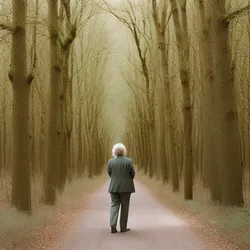
Simplified Story:
Walking has been a favorite pastime of some of the world’s greatest thinkers, such as Albert Einstein and Steve Jobs. These famous individuals found that going for walks helped them to come up with innovative ideas and reduce stress. Walking is an accessible form of exercise that can be done almost anywhere without special equipment or training. Furthermore, walking can stimulate the senses and provide inspiration. Therefore, taking a walk can be a great way to boost creativity and cognitive function, making it an ideal activity for people of all ages and abilities.
Full Story:
Throughout history, some of the world’s greatest thinkers, innovators, and visionaries have found solace and inspiration in one of the simplest of activities: taking a walk. From the ancient Greeks to modern-day scientists, it seems that going for a stroll has been a go-to practice for enhancing creativity, reducing stress, and boosting cognitive function.
Perhaps the most famous example of a walking genius is Albert Einstein. The renowned physicist would often go on long walks, sometimes for hours on end, during which he would ponder the mysteries of the universe. It is said that he came up with some of his most groundbreaking ideas, including his theory of relativity, while out on a walk.
Steve Jobs, the co-founder of Apple, was another fan of the walking meeting. He famously held important discussions with colleagues and investors while out on a stroll around his neighborhood. Jobs saw walking as a way to stimulate creativity and clear his mind, allowing him to come up with innovative solutions to complex problems.
But it’s not just tech moguls and physicists who have benefitted from the simple act of walking. The philosopher Friedrich Nietzsche was known to go on long walks in the Swiss Alps, where he found inspiration for many of his most influential works. The natural beauty of the mountains, combined with the physical activity of walking, seemed to unlock his creativity and intellectual potential.
And it’s not just individuals who have found success with walking. Companies like Google and Facebook have embraced the walking meeting as a way to foster creativity and collaboration among their employees. Research has shown that walking can improve cognitive function and creativity, making it an ideal activity for brainstorming and problem-solving.
So what is it about walking that makes it such an effective tool for enhancing creativity and mental performance? For one, walking has been shown to reduce stress and anxiety, which can be major barriers to clear thinking and innovation. Exercise also boosts blood flow to the brain, providing a fresh supply of oxygen and nutrients that can help improve cognitive function.
But there’s something else about walking that sets it apart from other forms of exercise. When we go for a walk, we’re able to take in our surroundings in a way that we can’t when we’re focused on other activities like running or cycling. The sights, sounds, and smells of our environment can stimulate our senses and provide a rich source of inspiration and ideas.
Walking also has the added benefit of being a low-impact and accessible form of exercise. You don’t need any special equipment or training to go for a walk, and it can be done virtually anywhere, making it an ideal activity for people of all ages and abilities.
In a world that often glorifies hustle and productivity, it’s easy to overlook the simple pleasures and benefits of going for a walk. But for some of the greatest minds in history, taking a stroll has been a vital component of their creative process and intellectual output. So the next time you’re feeling stuck or in need of inspiration, consider taking a cue from the walking geniuses of the past and go for a leisurely stroll. Who knows what brilliant ideas may come to you along the way?
Questions:
Which famous individuals mentioned in the article are known for taking walks to boost their creativity and cognitive function?
What are some of the benefits of walking for mental health and cognitive function, according to the article?
Why do companies like Google and Facebook embrace walking meetings, according to the article?
Do you think that taking walks can help individuals overcome creative blocks and come up with innovative ideas? Why or why not?
In your opinion, what other activities can be done to improve mental health and cognitive function aside from walking?
Fill In the Blanks:
Throughout history, some of the world’s greatest ______, innovators, and visionaries have found solace and inspiration in one of the simplest of activities: taking a walk.
From the ancient Greeks to modern-day scientists, it seems that going for a stroll has been a go-to practice for enhancing creativity, reducing stress, and boosting ______ function.
Jobs saw walking as a way to ______ creativity and clear his mind, allowing him to come up with ______ solutions to complex problems.
For one, walking has been shown to ______ stress and anxiety, which can be major barriers to clear thinking and innovation.
The sights, sounds, and smells of our environment can stimulate our ______ and provide a rich source of inspiration and ideas.
Walking also has the added benefit of being a low-impact and ______ form of exercise.
You don’t need any special ______ or training to go for a walk, and it can be done virtually anywhere, making it an ideal activity for people of all ages and abilities.
innovative, senses, stimulate, reduce, thinkers, cognitive, accessible, equipment
Vocabulary:
pastime - an activity that is done for enjoyment rather than work, duty or necessity (noun)
thinkers - people who think deeply and reflect on various ideas, concepts, or problems (noun)
innovative - introducing new and original ideas or methods (adjective)
reduce - to make something smaller or less in size, amount, or importance (verb)
accessible - able to be reached, entered, or used by people who have a disability or who are not as physically or financially able (adjective)
equipment - the necessary items, tools or machinery needed for a particular purpose or activity (noun)
stimulate - to encourage or cause something to happen, develop, or become more active (verb)
senses - any of the faculties by which the body perceives an external stimulus; sight, smell, hearing, taste, and touch (noun)
cognitive - relating to mental processes such as thinking, reasoning, learning, and remembering (adjective)
blocks - obstacles or barriers that prevent progress, development or creativity (noun)
innovative - introducing new and original ideas or methods (adjective)
**** - having strong opinions and expressing them forcefully, regardless of evidence or the views of others (adjective)




